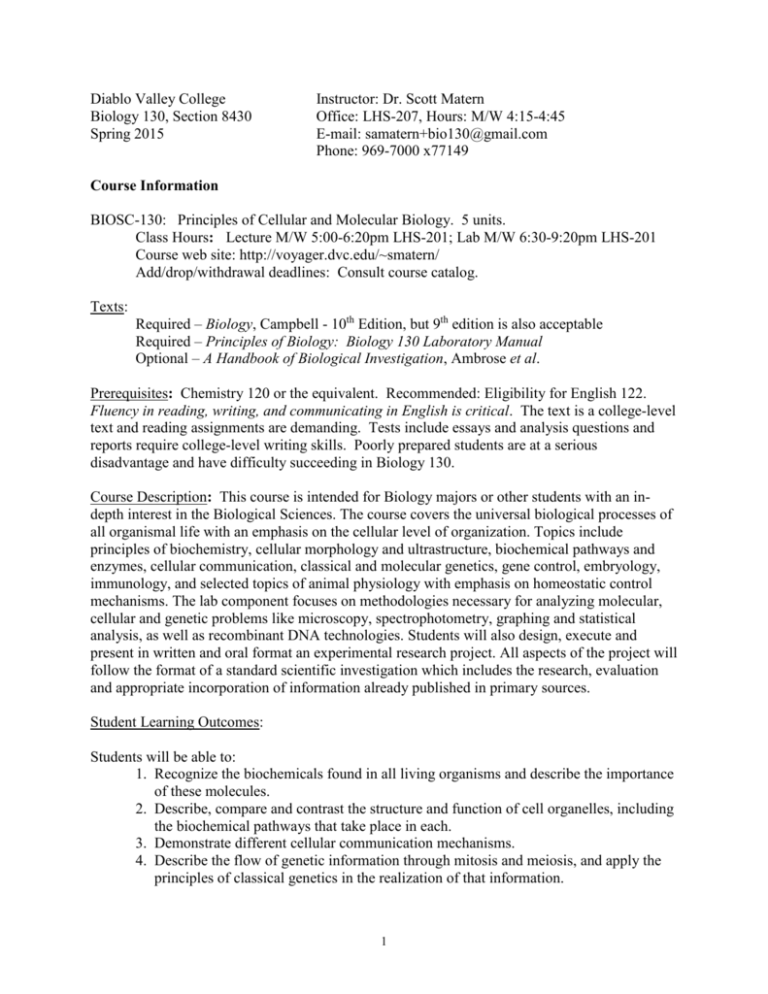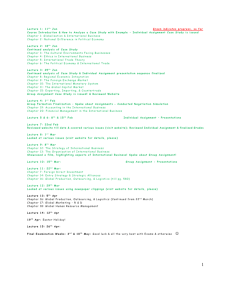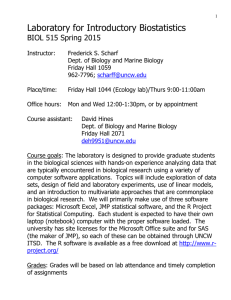Spring 2015 - Diablo Valley College
advertisement

Diablo Valley College Biology 130, Section 8430 Spring 2015 Instructor: Dr. Scott Matern Office: LHS-207, Hours: M/W 4:15-4:45 E-mail: samatern+bio130@gmail.com Phone: 969-7000 x77149 Course Information BIOSC-130: Principles of Cellular and Molecular Biology. 5 units. Class Hours: Lecture M/W 5:00-6:20pm LHS-201; Lab M/W 6:30-9:20pm LHS-201 Course web site: http://voyager.dvc.edu/~smatern/ Add/drop/withdrawal deadlines: Consult course catalog. Texts: Required – Biology, Campbell - 10th Edition, but 9th edition is also acceptable Required – Principles of Biology: Biology 130 Laboratory Manual Optional – A Handbook of Biological Investigation, Ambrose et al. Prerequisites: Chemistry 120 or the equivalent. Recommended: Eligibility for English 122. Fluency in reading, writing, and communicating in English is critical. The text is a college-level text and reading assignments are demanding. Tests include essays and analysis questions and reports require college-level writing skills. Poorly prepared students are at a serious disadvantage and have difficulty succeeding in Biology 130. Course Description: This course is intended for Biology majors or other students with an indepth interest in the Biological Sciences. The course covers the universal biological processes of all organismal life with an emphasis on the cellular level of organization. Topics include principles of biochemistry, cellular morphology and ultrastructure, biochemical pathways and enzymes, cellular communication, classical and molecular genetics, gene control, embryology, immunology, and selected topics of animal physiology with emphasis on homeostatic control mechanisms. The lab component focuses on methodologies necessary for analyzing molecular, cellular and genetic problems like microscopy, spectrophotometry, graphing and statistical analysis, as well as recombinant DNA technologies. Students will also design, execute and present in written and oral format an experimental research project. All aspects of the project will follow the format of a standard scientific investigation which includes the research, evaluation and appropriate incorporation of information already published in primary sources. Student Learning Outcomes: Students will be able to: 1. Recognize the biochemicals found in all living organisms and describe the importance of these molecules. 2. Describe, compare and contrast the structure and function of cell organelles, including the biochemical pathways that take place in each. 3. Demonstrate different cellular communication mechanisms. 4. Describe the flow of genetic information through mitosis and meiosis, and apply the principles of classical genetics in the realization of that information. 1 5. Describe structure, function, and control of genetic material on the molecular level, and how it relates to the development and maintenance of an organism. 6. Correlate anatomical structures with their functions. 7. Outline homeostatic control mechanisms for diverse physiological parameters. 8. Apply the scientific method of inquiry; using appropriate and effective tools in obtaining, evaluating, and interpreting data and information. 9. Demonstrate the proper use of a spectrophotometer, centrifuge, micropipettors, compound and dissecting microscope, thermocycler, and/or electrophoresis equipment. Course Policies Attendance: Regular attendance is critical to understanding this subject matter and it is expected that you will attend all lecture and laboratory sessions. Part of your grade is based on participation, and you must be present in order to participate. Due to limited space, it is not possible to make up work in another section. If you miss class, you are still responsible for all handouts, assignments, and announcements made in class. Absences may be excused in the event of illness (with doctor note), religious holidays and DVC athletic/scholastic events if you contact me before class (at least 1 week before the absence for religious holidays and DVC activities) and meet with me upon your return to arrange completion of any missed work. Unexcused absences will result in a zero for the missed lab. Students with four or more absences in lecture or lab may be dropped from the course. If you wish to withdraw from the class it is your responsibility and failure to do so before the deadline may result in an F for the course. Class Participation: Everyone should participate actively and be prepared to answer questions (I often call on students during class). I encourage everyone to participate in class discussions and to ask questions – you probably will not be the only one wanting to ask that question. Also, a portion of your lab grade will be based on your active and constructive participation in class. Common Courtesy: I will begin class on time and I expect you to be there on time. Please be seated and ready for class to begin promptly at 5:00. If you must arrive late, please avoid disturbing the class. Please turn your phone off before class begins. Behavior that disrupts other students will not be tolerated and students that are being disruptive will be asked to leave the classroom. Academic Dishonesty: Cheating is any form of copying (including lab reports, graphs, etc.), dishonest use of someone else's work (including internet sources), or data fabrication. If you have any doubt about what constitutes cheating, ask me. To protect the vast majority of students who do NOT cheat, I employ various methods to discourage cheating, such as photocopying exams before returning them. Anyone caught cheating will receive a zero for the assignment. Additional consequences will typically include being referred to the Dean of Students. 2 Student Support Services Many support services are available on campus including: The Life science Resource Center in LHS-116, Learning Center, Computer Lab, Assessment Center, Disabled Students Programs and Services, Career Center, Media Center, ESL (English as a Second Language), and the Counseling Center. If you have special needs or if you want any more information on the resources available to you on campus, please ask me. Students in this course will benefit from the free tutoring services offered at DVC, which will assist them in becoming independent learners by helping them improve their critical thinking and study skills, prepare for tests, identify techniques for learning a new subject, solve problems, and organize ideas into essays. Many students think that “good” students will not benefit from tutoring. However, getting help to keep up with your work can strengthen your understanding of course material. To get the most out of your experience at DVC, take advantage of the free tutoring available to you. 3 Grading Midterms (40%): There will be four 100-point midterm exams given on the days listed in the schedule. I will distribute sample questions before each of these exams. Your Final Exam percentage may be substituted for your lowest midterm score. There will be no makeup exams given; if you miss an exam, the Final Exam grade will automatically substitute for one missed midterm exam instead of your lowest score. Laboratory (30%): Quizzes, written reports and laboratory performance will all be used to determine your lab grade. Unless otherwise stated, all work is due at the beginning of lab, although late work may be turned in up to one day late for half credit. Missed lab sessions will be given an automatic zero unless you contacted me before lab to report that you were going to be absent and the absence is excused in writing. Arriving late, leaving early, failure to clean up after yourself, etc. will be reflected in the “active and constructive participation” portion of your grade, which is equivalent to two lab quizzes. Final Exam (15%): A comprehensive final exam, covering the entire semester, will be given Monday, May 18th, from 5:00-7:00pm. Project (15%): You will choose (with instructor approval) your own scientific research project, design and perform appropriate experiments, then collect and analyze the data. A written report will be handed in and an oral report will be given to the class. In addition to guidance provided by the instructor, there is an online tutorial program to assist you in planning and carrying out this assignment. You will be asked to provide proof that you completed your project; failure to show adequate proof will result in a zero on the project. Additional details will be given in class. A penalty of 10% per day will be assessed for late project reports. Extra Credit (1%): Occasionally throughout the semester I will give short, unannounced quizzes for extra credit. These quizzes will test your understanding of recently covered material or they may test your advance preparation for that day's topic. The quizzes may be given at any time during lecture or lab. In addition to the quizzes, in rare instances I may assign extra-credit homework. At the end of the semester, the points for all extra credit assignments combined will be adjusted so that there is a total of 10 extra credit points available for the semester. This is equivalent to 1% of your total course grade. Regrading: If you feel that an error has been made in the grading of your work, you must bring it to my attention within two weeks to request a regrade. Final grade distribution: 85% and above ............................... 75% - 84% ...................................... 65% - 74% ...................................... 55% - 64% ...................................... Below 55% ....................................... 4 A B C D F Biology 130, section 8430 Spring 2015 Tentative Lecture Schedule Date Jan 12 Jan 14 Jan 19 Jan 21 Jan 26 Jan 28 Feb 2 Feb 4 Feb 9 Feb 11 Feb 16 Feb 18 Feb 23 Feb 25 Mar 2 Mar 4 Mar 9 Mar 11 Mar 16 Mar 18 Mar 23 Mar 25 Mar 30 Apr 1 Apr 6 Apr 8 Apr 13 Apr 15 Apr 20 Apr 22 Apr 27 Apr 29 May 4 May 6 May 11 May 13 May 18 Reading (Campbell 10th Ed.) Ch. 1, Ch. 2 Ch. 3 Topic Introduction to Bio 130 Water Holiday – No Class Organic Chemistry Macromolecules Enzymes Metabolism Midterm I Cell Structure Cell Structure continued Holiday – No Class Membranes, Cell Signaling Nervous System Photosynthesis Photosynthesis continued, Glycolysis Cellular Respiration Midterm II Mitosis Meiosis Mendelian Genetics Genes and Chromosomes DNA Spring Break – No Class Spring Break – No Class Protein Synthesis Gene Regulation Midterm III Evolution Homeostasis Circulation Respiration Immunology Embryology Midterm IV Reproduction, Endocrinology TBA, Coming Attractions Final Exam 5:00-7:00 p.m. Ch. 4 Ch. 5 (66-83) Ch. 8 (151-159) Ch. 8 (141-151) Ch. 6 Ch. 6 Ch. 7, Ch. 11 (210-219, 223-225) Ch. 48, Ch. 49 (1079-1083) Ch. 10 Ch. 9 Ch. 9 Ch. 12 Ch. 13 Ch. 14 Ch. 15, Ch. 23 (480-487) Ch. 5 (84-89), Ch. 16 Ch. 17 Ch. 18 (360-375) Ch. 22, Ch. 23 Ch. 40 (875-884) Ch. 42 (915-932) Ch. 42 (933-943) Ch. 43 (946-963) Ch. 47 (parts TBA), Ch. 18 (376-379) Ch. 46 (1022-1033), Ch. 47 (1037-1041) TBA 5 Biology 130, section 8430 Spring 2015 Tentative Laboratory Schedule Date Jan 12 Jan 14 Jan 19 Jan 21 Jan 26 Jan 28 Feb 2 Feb 4 Feb 9 Feb 11 Feb 16 Feb 18 Feb 23 Feb 25 Mar 2 Mar 4 Mar 9 Mar 11 Mar 16 Mar 18 Mar 23 Mar 25 Mar 30 Apr 1 Apr 6 Apr 8 Apr 13 Apr 15 Apr 20 Apr 22 Apr 27 Apr 29 May 4 May 6 May 11 May 13 May 18 Laboratory topic Reading (Campbell 10th Ed.) Introduction, Scientific Method (1), Projects (2) Measurement of Starch Synthesis (3) Holiday – No Class Separating and Identifying Organic Molecules (4) Enzymes, Parts I-IV (5) Enzymes, Parts V-VII (5) Test Taking Skills (7) Introduction to Drosophila (6), Projects (2) The Microscope (8) Cell Structure and Function (8) Holiday – No Class Cell Structure and Function (8) continued, Flies (6) Cell Permeability (9), Fly Counting (6) Cell Surface Receptors (9), Fly Counting (6) Plant Pigments and Photosynthesis (11) Cellular Respiration (10) Probability and Chi Square (12), Flies (6) Chromosomes and Cell Division (13) Chromosomes and Karyotyping (14) Genetics Problems (15) Fly Analysis (5) DNA and PCR (16) Spring Break – No Class Spring Break – No Class Gel Electrophoresis (16), Recombinant DNA (17) Recombinant DNA (17), Protein Synthesis (18) Fetal Pig Dissection (20) Fetal Pig Dissection (20), continued Cardiac Cycle (21) Project Wrap-up (7) Project Reports Project Reports Circulation and Respiration (22) Amphibian Dev. (23), Urchins (24) Amphibian Dev. (23) cont.; Repro Histology (24) Wrap-up, Review Final Exam 5:00-7:00 p.m. 6 pp. 68-74 pp. 68-74, 77-80 pp. 152-160 pp. 152-160 pp. 94-101 Ch. 6 Ch. 6 Ch. 7 Ch. 7 Ch. 10 pp. 269-271 Ch. 12, Ch. 6 pp. 297-300 Ch. 14, Ch. 15 Ch. 14-16 Ch. 14-16, Ch. 20 (396-407) Ch. 14-16, Ch. 20 (396-407) Ch. 20, Ch. 17 Ch. 40, Ch. 41 Ch. 40, Ch. 41 Ch. 42, 43 Ch. 42, 43 Ch. 47 Ch. 47 Biology 130, section 8430 Spring 2015 Project Due Dates Jan 21 or before Jan 26 or before Feb 9 or before Feb 23 or before Mar 11 – Mar 25 Apr 24 Apr 27 Apr 27 Apr 29 Do Project Tutorials 1 & 2 (nothing to turn in). Turn in first complete draft of project proposal. Proposal must be approved by me BEFORE you start collecting data! Second draft of proposal due. Deadline for final approval of project proposal (will be strictly enforced). Do Project Tutorial 3 upon approval. Submit data sheets before beginning research. Individual conferences (by appointment). Do Project Tutorials 4 & 5 before conference. Do Project Tutorial 6 after your conference. Abstracts due. Details given in Project Tutorial 5 and discussed in class. Written reports due. Two copies are to be handed in. Reports are to be typed, double-spaced. The exact format is detailed in Project Tutorial 5 and in Lab 2. Oral reports given by half the class Oral reports given by half the class Project Grading – 150 points total (This will be discussed in greater detail during class.) A. Execution (50 pts.) 1. Proposal (10 pts. each for up to 3 drafts = 30 pts.) - Drafts should be on time, complete, rigorous, and address all previous comments. 2. Data Sheets (5 pts.) 3. Conference (5 pts.) 4. Project Execution (10 pts.) B. Written Report (75 pts.) - Report should be complete, well-written, carefully proofread, and properly formatted. Each section should contain the appropriate content and high degree of scientific rigor. C. Oral Presentation (25 pts.) - Emphasis is on effective communication of information to your audience. D. Scope (10 pts. maximum EC to replace points lost above) - See detailed explanation on “project grading rubric.” 7







